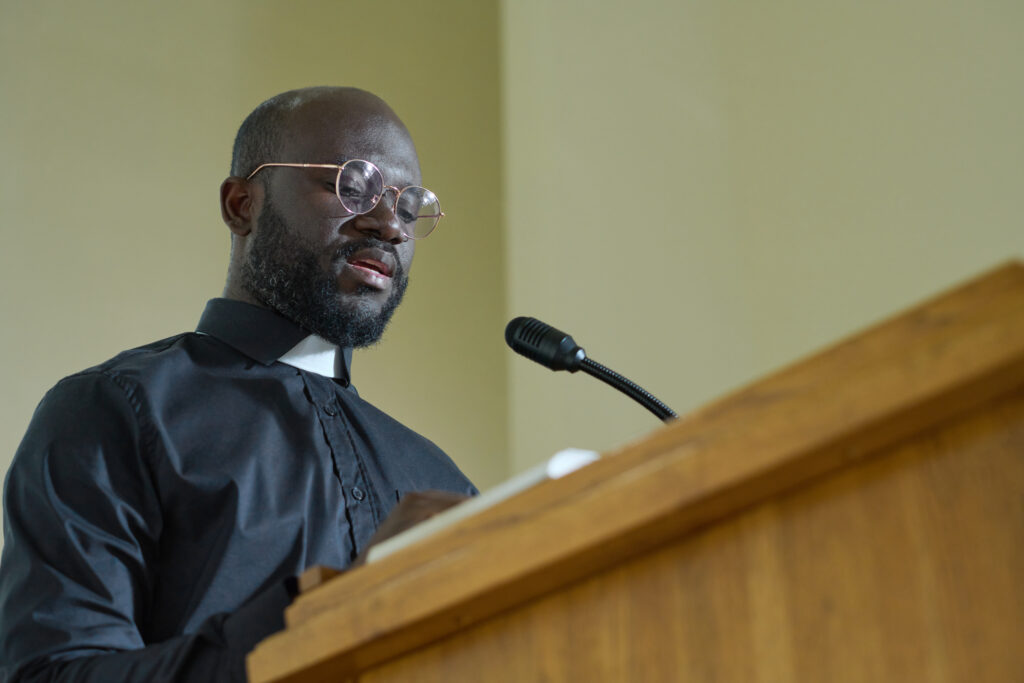To thrive in bi-vocational ministry, surround yourself with a network of praying confidantes, repeatedly share your vision, and avoid comparison.
In many religious circles, the idea of being a pastor or leader has always been attached to the notion of a full-time commitment. However, as times have changed, new responsibilities and activities have caused many ministry leaders to opt for bi-vocational ministry.
Bi-vocational ministry is an essential aspect of the task of sharing the gospel in the modern world, particularly when it comes to urban church planting. This article will explain what bi-vocational ministry is, examples of it in action, mistakes to avoid, and the ways World Impact is providing access to the tools and resources necessary for you to become bi-vocational.

What is Bi-vocational Ministry?
Bi-vocational ministry is a concept within faith circles where pastors or church leaders are tasked with ministering to people in communities while also holding down a secular job to pay their bills. Assignments might include pastoring a church, serving on a pastoral team, or serving within a ministry.
As described by Got Questions:
“A bi-vocational (“dual-occupation”) pastor is usually shepherding a church of smaller size or serving in an area with a depressed economy.”
In comparison to full-time ministry, bi-vocational ministry has become a much more popular option among leaders as the cost of ministry education and living expenses continue to rise. Did you know that a seminary education costs between $35,000 – $50,000? Opting for a dual career allows leaders to support themselves, whether it be to pay off debt or simply make ends meet, while still fulfilling their calling to serve in ministry. Additionally, choosing bi-vocational ministry can be a practical solution for churches struggling to afford a full-time pastor.
Examples of Bi-vocational Ministry
There are numerous examples of bi-vocational ministry in various communities throughout the world. Particularly in poor communities, these pastors are an integral part of many small churches and communities, where churches struggle to become self-sustaining and adequately support their staff financially.
At World Impact, we see bi-vocational leaders like Dioane Gates and many others like him serving the community through their primary vocation while leading a ministry.
In this video, Mr. Gates outlines the challenges he’s faced along the way and offers wisdom and advice to other bi-vocational workers.
As you can imagine, the challenges are numerous. Juggling two careers comes at a cost, but it also comes with excitement and impact, which is exactly what we hear from other leaders in the World Impact sphere. Keep reading to discover the mistakes most bi-vocational leaders make, and the opposing truth we are called to live by.
5 Critical Errors Made in Bi-Vocational Ministry – And How to Fix Them
Mistake #1: Trying to be a superhero.
Leaders who straddle the worlds of ministry and secular career report they made the mistake of trying to go it alone. When they didn’t call upon the help of a capable team, the work was more difficult and isolating.
Why would leaders attempt to go it along? Dioane Gates reported that he was hesitant to bother anyone else since it was “his calling.” He continues:
“I didn’t want to burden anybody. I didn’t want anybody else to have to worry about the things I was worried about so I chose to just decide, you know what? I’ll just do it all on my own.”
But the truth is so much more inclusive and exciting than that.
The Truth
God has equipped His church to do His work! When we rob people from the opportunity to serve, we are stealing their joy. They have been equipped and simply need opportunities to serve.

Mistake #2: Becoming distracted by comparison.
Bi-vocational ministry can present several challenges for pastors, including feeling like they have to continually make significant impacts to prove their worth, all while operating with less time and monetary resources.
It’s common for bi-vocational pastors to become discouraged when they see other ministries flourishing and growing while theirs isn’t. However, comparing oneself to others is a losing game that can lead to frustration and disappointment. This feeling can be amplified by the challenges of bi-vocational ministries, such as operating out of a portable setting, minimal resources, or a shortage of workers.
To maintain one’s focus and motivation, pastors of all types must make a conscious effort to avoid these types of comparisons and instead focus on the unique mission and purpose of their ministry.
The Truth
Regardless of the ministry, leaders need to trust in God to provide what they need. This means not only praying for both human and monetary resources but also recognizing that everything ultimately belongs to Him. This understanding should embolden leaders to ask for help when needed, confident that God will provide in His own way and time.
Mistake #3: Forgetting the mission.
For pastors, it’s easy to get caught up in the daily grind of ministry work and forget the bigger picture. When they become too focused on their tasks and responsibilities, they can lose sight of their mission and purpose. This not only creates a sense of burnout and stress but can even lead to spiritual emptiness. As a result, pastors may begin to question their calling or purpose. However, it’s important to remember that pastors are called by God to do His work and serve His Kingdom. By keeping this in mind, pastors can stay focused on their mission and find renewed purpose and meaning in their work.
The Truth
When pastors invite others to join them in their mission and actively seek out opportunities to collaborate and build community, their enthusiasm and sense of renewal become infectious. By sharing their vision and asking for support and involvement, pastors can inspire others to become invested in the mission and work alongside them towards a common goal. This type of collaboration and involvement not only helps the mission to thrive but also creates a sense of community and shared purpose among those involved.
Mistake #4: Neglecting the power of repetition.
Assuming that a leader only has to tell their mission or vision to their team once is a common mistake that pastors can make, leading to miscommunication and missteps.
Failure to take the time to reiterate the mission and vision can lead to a lack of clarity and commitment within the team, making it difficult to make real progress toward achieving the mission. Good communication and clarity are critical for all effective leaders.
The Truth
Repeat, and then repeat again.
It’s important to understand that every team member has a unique perspective and understanding, and may not fully grasp the mission or vision on the first go. Repetition and clarification are key in ensuring that everyone is on the same page and understands their role in achieving the vision. In particular, when talking about bi-vocational ministry, the importance cannot be overstated since a leader’s exposure to their team is limited.

Mistake #5: Burning out through busyness.
One of the biggest challenges facing pastors, particularly bi-vocational leaders, is the tendency to become overworked, leading to burnout. When pastors become too busy and overcommitted, they can lose sight of their own needs and the needs of their community. The exhaustion and stress of trying to meet everyone’s expectations can be overwhelming and depleting, leading to physical, emotional, and spiritual fatigue. Often, pastors may stop taking care of themselves, neglecting their own physical and emotional health, which can lead to long-term consequences.
Truth
It’s important for pastors to establish healthy boundaries and intentionally seek out opportunities for rest and renewal to avoid burnout and continue serving their communities.
In addition, bi-vocational leaders need to have a support system of trustworthy confidantes who can recognize the signs of burnout and provide guidance on how to change course. These confidantes can be trusted friends, family members, or professional colleagues who understand the pressures and challenges of bi-vocational ministry. They can offer encouragement, wisdom, and accountability, helping leaders to stay on track and avoid burnout. Having a strong support system in place is crucial for bi-vocational leaders to maintain their physical, emotional, and spiritual health while juggling multiple responsibilities.
Mistake #6: Overlooking the importance of a spiritual network.
Neglecting to develop a spiritual network can be dangerous for pastors as it leaves them without an essential support system. As a result, pastors may begin to feel disconnected from their spirituality and lose sight of God’s faithfulness in their lives. In turn, this can lead to feeling further disillusioned and disconnected from their ministry work, potentially leading to a loss of motivation and purpose.
The Truth
Having a spiritual network of believers who pray fervently is essential for leaders to avoid burnout. These individuals intercede on the pastor’s behalf and offer encouragement and godly wisdom when needed, making a significant difference in their overall well-being. Unlike having one or two individuals who may recognize the signs of burnout, a spiritual network of believers provides a broader and deeper level.

Bi-vocational Ministry Training
Getting trained for bi-vocational ministry may seem overwhelming or even impossible to some, but there are programs and workshops available for interested persons. These programs range in length and can be found in a variety of learning settings, making it easy to find one that best suits people’s needs.
At World Impact, we have been working for more than 50 years to develop training programs that properly equip individuals to serve and lead in ministry settings. Our Church-Based Seminary program equips urban church leaders with contextualized training, and it is designed for men and women in communities of poverty. Through partnerships with local churches, we can provide affordable, accessible, and effective training for church leaders and lay leaders. As a result, our cumulative graduate count is 2,327.
Will you consider supporting our Church-Based Seminary program? Your donation means more graduates are being commissioned into communities of poverty to share the Gospel and build healthy, thriving churches in poor neighborhoods. Join the movement today.
